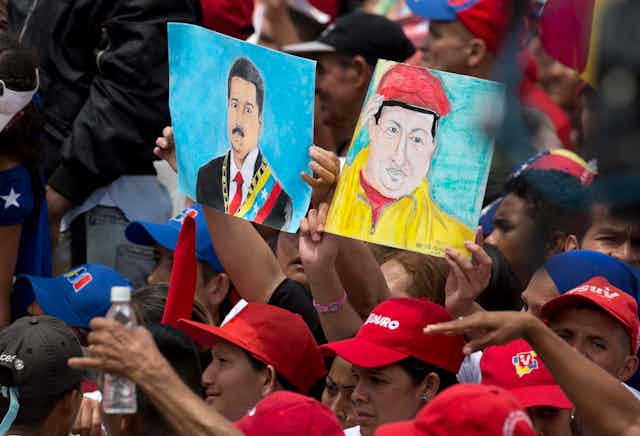As Venezuela’s flawed election on May 20 approaches, the country is dealing with one of the worst economic depressions in Latin American history. Venzuelans face dire shortages of food and medical supplies, with most people struggling to access enough to eat.
Universities have also been under assault, ever since the so-called “Bolivarian revolution,” led by late President Hugo Chávez, declared war against universities, scholars and students.
After gaining power in 1998, Chávez created a parallel university system. Meanwhile, he reduced funding to the traditional autonomous universities of Venezuela, eliminated their ability to elect authorities, attacked academic freedom and persecuted professors and students.
Chávez’s new institutions — such as the Bolivarian University of Venezuela and the Polytechnic Experimental University of the Armed Forces — are mainly organizations for political indoctrination and social control.
The situation has further deteriorated under President Nicolás Maduro’s tenure. University professors are migrating to other Latin American countries, Europe, the United States and Canada. Many students cannot complete their programs due to social and economic difficulties.
Some disciplines are literally emptied. Laboratories do not have updated equipment. Libraries cannot keep their collections of books and scientific journals up to date. Campus infrastructure is deteriorating due to lack of budget for maintenance.
But despite the terrible crisis, in a country that suffers a hyperinflation projected to reach 13,000 per cent this year, autonomous public and private universities are struggling to keep their programs, to do research with very limited resources and to protect institutions that are fundamental for freedom and democracy.
They are doing this in a context of violent repression of protests, out-of-control crime, shortages of food and medicines and predatory corruption at all levels of the state.
Student resistance
The student movement has been an important factor of resistance since the beginning of Chávez’s regime. Students played a key role in the defeat suffered by Chávez in the constitutional reform referendum of 2007.
In 2014, the students took the streets in protests throughout the country, and they did it again in 2017.

Last year, the repression notably increased, resulting in hundreds of injuries. At least 20 students were killed by police or military forces.
Some data can help put into perspective the scope and depth of the damage that the “Chavismo” movement (based on the ideology of Chávez) has caused to higher education. With the creation of the universities under government control, oriented to ideological indoctrination, the number of college students increased notably in Venezuela: From about 100,000 students in 2000 to about 250,000 in 2015.
However, the number of students graduating remained relatively low, at about 10,000 per year.
There are two ways to interpret these numbers. The first is that the supposed university “massification” under Chavismo has not allowed young people to complete their degrees.
The second is that the programs offered in the universities created by the regime do not maintain an adequate level of quality.
Campus invasions and assassinations
The salary of a full-time professor in an autonomous university in Venezuela varies between US$5 and US$20 per month, depending on the exchange rate used to make the calculation.
It is obvious that this meagre income, in a country with hyperinflation and undergoing a deep recession, results in a massive brain drain.
Venezuela is running out of university professors. Some universities have lost half of their scholars, according to the non-governmental organization Aula Abierta.
Students are also leaving universities and even the country. Aula Abierta has also reported that, in 2017, between 30 and 40 per cent of those who entered undergraduate programs in autonomous universities had left their studies.

All this occurs in a context of repressive violence by police, military and paramilitary forces of the Maduro regime. Professors and students have been arbitrarily detained. Many of them have been illegally subjected to trials before military courts.
Regime forces and their paramilitary groups have assassinated students. Police, the National Guard and criminal organizations linked to the revolution have invaded campuses and damaged university facilities.
Defending civilization against barbarism
But the Venezuelan autonomous and private universities are resisting.
They know that they are not only protecting knowledge, but also freedom — a fundamental value to ensure access to truth, in times of “fake news,” ideological obscurantism and moral decadence.
Venezuelan students excel in international competitions, as they did at the Model United Nations at the University of Harvard.
Scholars continue to do fundamental research for the country, such as that carried out at the Institute of Tropical Medicine of the Central University of Venezuela, despite the vandalism it is constantly subjected to.
The Venezuelan diaspora has mobilized around the world to raise funds to help universities, as alumni of the Simón Bolívar University have done.
As the Venezuelan writer and teacher Rómulo Gallegos would have said: To defend academic freedom is to defend civilization against barbarism.

